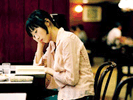Hou’s film continues in a similar vein of hermetic environment and translucently slight narrative that have come to define his later, apolitical (and largely transitional) works (beginning with The Flowers of Shanghai). Opening with the reassuringly familiar sight of the Mount Fuji Shochiku logo that can be seen at the beginning of many of Yasujiro Ozu’s films as well as a train traversing a horizon demarcated by power lines at dusk, Café Lumière then sharply diverges from Ozu’s familiar camerawork and images of Japan in the film’s inherent asymmetry, aesthetically irregular compositions, awkward angles (during the parents’ visit in Yoko’s apartment, Hou seemingly attempts an Ozu-like low angle then, faced with a troublesome, truncated image of the stepmother standing in the foreground, inexplicably pans up to reveal her face before resuming the low angle), and opaque and unengaging characters (except for Yoko’s stepmother, played by Kimiko Yo). Ostensibly centered on a struggling young writer (and impending single mother) named Yoko (Yo Hitoto) and her distanced relationships with the people around her (including an introverted bookstore owner named Hajime (Tadanobu Asano)), Hou resorts to familiar devices of expounding minimal narrative through telephone conversations, overdistilled ellipses (to the point of incoherence), and distended temps morts. By transposing his recurring themes of rootlessness and fractured families from Taiwan to Japan, Hou forgoes the entrenched historical mooring of his earlier films to create a more abstract – and personally less compelling, familiarly coded (if not formulaic) – image of contemporary urban alienation.
© Acquarello 2004. All rights reserved.
